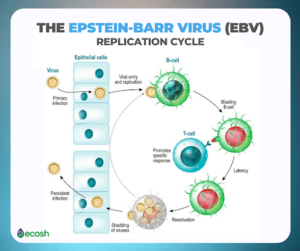In news– Recently, researchers at the Indian Institute of Technology (IIT) Indore have found how Epstein Barr Virus (EBV) affects brain cells and could lead to neurological disorders.
What does the study say?
- Using the Raman micro-spectroscopy technique, the research team explored the possible impacts of a cancer-causing virus on brain cells and found that it drives various changes in biomolecules such as fatty acids, carbohydrates, and protein components, leading to diseases of the central nervous system as well as brain cancer.
- However, scientists are yet to understand how this virus affects the cells of the brain and manipulates them.
- The study showed that there could be timely and gradual changes in various biomolecules in the neuronal cells under the viral influence.
- The team observed that the lipid, cholesterol, proline, and glucose molecules increased in the cells under the viral influence. These biomolecular entities could ultimately play pivotal roles in the viral usurpation of cells.
- Meanwhile, they also had insights into whether these biomolecular changes can be correlated to virus-associated impacts and linked to neurological complications.
- This study aids in the understanding of EBV-mediated biomolecular changes in the various compartments of the central nervous system leading to a better understanding of nervous system diseases.
- The study is also helpful in establishing the advantages of Raman micro-spectroscopy, a cost-effective and non-invasive technique, in carrying out studies on virus-associated cellular complications in clinical settings.
- It could provide an upper hand in analysing clinical samples in comparison to other techniques, which require advanced setups for studying the virus-associated changes in cells, tissues, and organs.
What is Epstein Barr Virus (EBV)?
- Epstein-Barr virus (EBV), also known as human herpesvirus 4, is a member of the herpes virus family.
- It is one of the most common human viruses. EBV is found all over the world.
- It spreads most commonly through bodily fluids, primarily saliva.
- It can cause infectious mononucleosis, also called mono, and other illnesses.

- While it usually does not cause any harm, the virus gets reactivated inside the body in some unusual conditions like immunological stress or immunocompetence.
- Symptoms of EBV infection can include- fatigue, fever, inflamed throat, swollen lymph nodes in the neck, enlarged spleen, swollen liver, rash.
- Many people become infected with EBV in childhood. EBV infections in children usually do not cause symptoms, or the symptoms are not distinguishable from other mild, brief childhood illnesses.
- There is no vaccine to protect against EBV infection.
















